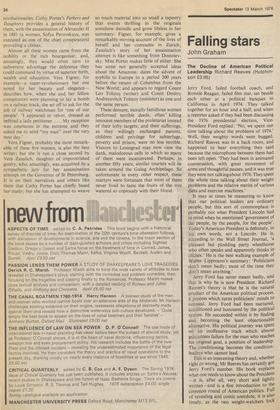Falling stars
John Graham The Decline of American Political Leadership Richard Reeves (Hutchinson 0.95)
Jerry Ford, failed football coach, and Ronnie Reagan, failed film star, sat beside each other at a political banquet in California in April 1974. They talked together for an hour and a half, and when a reporter asked if they had been discussing the 1976 presidential election, VicePresident Ford replied: `No, we spent our time talking about the problems of 1974.' Well, their weighty words were bugged. Richard Reeves was in a back room, and happened to hear everything they said because the microphone between them had been left open. 'They had been in animated conversation, with great movement of arms and thoughtful pauses, and it was true they were not talk ing about 1976. They spent the whole time talking about their weight problems and the relative merits of various diets and exercise machines.'
It may at times be reassuring to know that our political leaders are ordinary people, but this sort of commonplace is probably not what President Lincoln had in mind when he mentioned 'government of the people, by the people, for the people'. Today's American President is definitely, in his own words, not a Lincoln. He is, according to the Wall Street Journal, 'a pleasant but plodding party wheelhorse who often speaks and apparently thinks in clichés.' He is the best walking example of Walter Lippmann's summary: 'Politicians don't mean badly; most of the time they don't mean anything.'
Jerry Ford has never meant badly, and that is why he is now President. Richard Reeves's theory is that he is the natural product of the American political process, a process which turns politicians' minds to oatmeal. Jerry Ford had been nurtured, conditioned and honoured by the political system. He succeeded within it by finding and becoming the least objectionable alternative. His political journey was spent on an inoffensive track which almost guticantees failure for the man who reaches his original goal, a position of leadership. The conditioning becomes the condition: leaders who cannot lead.
This is an interesting theory and, whether right or wrong, Mr Reeves has certainly got Jerry Ford's number. His book explains what one needs to know about the President —it is, after all, very short and lightly written—and is a fine introduction to the common round of American politics. Full of revealing and comic anecdote, it is also timely, as the two weight-watchers lock together in something less than Titanic embrace in the primary elections. But the theory deserves more thought, since it addresses the fundamental question of public life from Plato to Mrs Thatcher: 'How should we choose our political leaders?' Certainly, Jerry Ford is the terminus of one particular track in American politics, and there are a great many Fords in Congress. It is equally true that his predecessors—Kennedy, Johnson, Nixon—were leaders rather than followers, but political philosophers who bewail the recent loss of leadership in the West might like to ponder the unholy legacy of the Kennedy-Johnson-Nixon years. If that was leadership, perhaps we are better off with oatmeal.



































 Previous page
Previous page